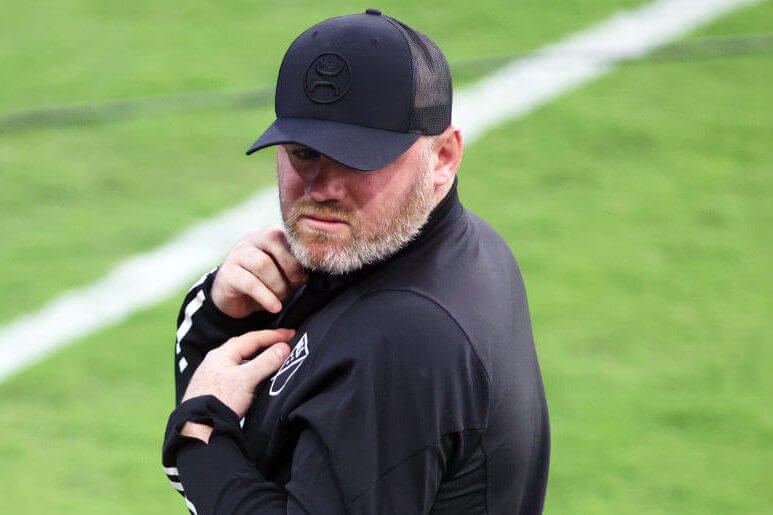After a season and a half in charge of D.C. United, Wayne Rooney and the club have agreed to part ways. It was an underwhelming stint for Rooney, as D.C. failed to qualify for the MLS playoffs this season.
Rooney is now expected to return to the Championship, where he began his managerial career with Derby County. Reports have linked him to Birmingham City, who currently sit sixth in the table after a July takeover by a group that now includes legendary NFL quarterback Tom Brady.
So what can fans of Rooney’s next club expect from the 37-year-old? Here are the takeaways from his time in D.C.:
The positives
Rooney showed adaptability as a coach. He arrived with promises of playing football “the right way,” so to speak, displaying the same ambitions many foreign coaches do when they land in MLS. Rooney’s D.C. United did their best to abandon former head coach Hernán Losada’s frenetic, high-pressing system in favor of a possession-oriented approach but it took the Englishman only a few weeks to realize he simply did not have the talent on the field to execute that vision.
Instead, he chose something a bit more direct, focusing his efforts on being sound in midfield and in central defense. He built much of the club’s attack around former Crystal Palace forward Christian Benteke, and for a time, it worked. Just before the mid-season break, things were coming together for United, with Benteke, Nottingham Forest loanee Lewis O’Brien and a few others combining to play entertainingly, albeit simply.

Rooney tried to play possession-based soccer (Photo: JIM WATSON/AFP via Getty Images)
To many United fans, it felt like a bit of a salve. O’Brien is a good example of another of Rooney’s positives: the power of his name. Stuck in limbo after an aborted loan elsewhere failed, O’Brien joined D.C. without hesitation after hearing from Rooney. The influence of the English legend was something O’Brien spoke openly about, as did Benteke, who spoke glowingly about the influence Rooney had on his decision to come to MLS.
Rooney can be charming and approachable and very down to earth, and was an egalitarian during his stays in MLS, both as a player and a coach. In a league that’s very much eschewed the old way of doing things, Rooney was a rare bird: a player’s coach. At Derby County, Rooney gave a slew of academy products their first taste of first-team action. He was forced to do so by a transfer ban and the club’s sorry state of financial affairs. Some of those players became success stories; at United, one might say the same.
He signed promising academy players like Matai Akinmboni and Jackson Hopkins to first-team deals and showered midfielder Ted Ku-DiPietro with praise throughout 2023, at one point calling him one of the most promising young players in America. Even when his squad was relatively healthy, Rooney continued to give United’s young players opportunities.
The negatives
Rooney, like nearly every other of United’s managers in recent memory, had a built-in excuse for poor results when he arrived in D.C. — the club’s notoriously thrifty nature.
United, though, has chosen a different path in recent transfer windows, finally joining the league’s highest-spending clubs. And while D.C.’s roster is by no means full of world-beaters, the club has its share of talents, like Benteke and ex-Leeds United midfielder Mateusz Klitsch. It feels reasonable, frankly, to have expected Rooney to make playoffs with D.C.’s current squad. Yet he didn’t.
During his playing days in MLS, Rooney was a famously effective motivator and extracted sometimes superhuman performances out of his teammates, many of whom were average MLS players. The same was expected out of him as a coach, but D.C. sometimes looked unmotivated and uncommitted this year.

Rooney’s team had holes in defense (Photo: JIM WATSON/AFP via Getty Images)
Defensively, the club was erratic and at times atrocious, with Rooney regularly lamenting his side’s habit of giving up early, careless goals.
Throughout the year, Rooney also lambasted the officiating in MLS, suggesting at some points that the league’s referees, as a group, more or less had it out for United. Right up to the bitter end, he criticized the league’s implementation of VAR. Many of his comments had merit, but MLS’ sometimes problematic officiating affects all of the league’s clubs and is hardly unique to MLS. Sometimes, it felt like Rooney was searching for excuses.
His eye for talent sometimes faltered, as well. While Rooney was keen on some gems — O’Brien, for example — he also brought in his share of flops, namely Jamaican international Ravel Morrison, who followed Rooney to D.C. from Derby County. Morrison’s salary tripled in MLS, and he never found his footing, eventually falling out of the club’s plans entirely early this year. Rooney, though, remained interested in Morrison and tried to bring him back into the fold toward the tail end of United’s season. That never happened, though: the club was eager to use his roster spot and salary hit to purchase another player, something they weren’t able to do.
(Photo: Daniel Kucin Jr./Icon Sportswire via Getty Images)

